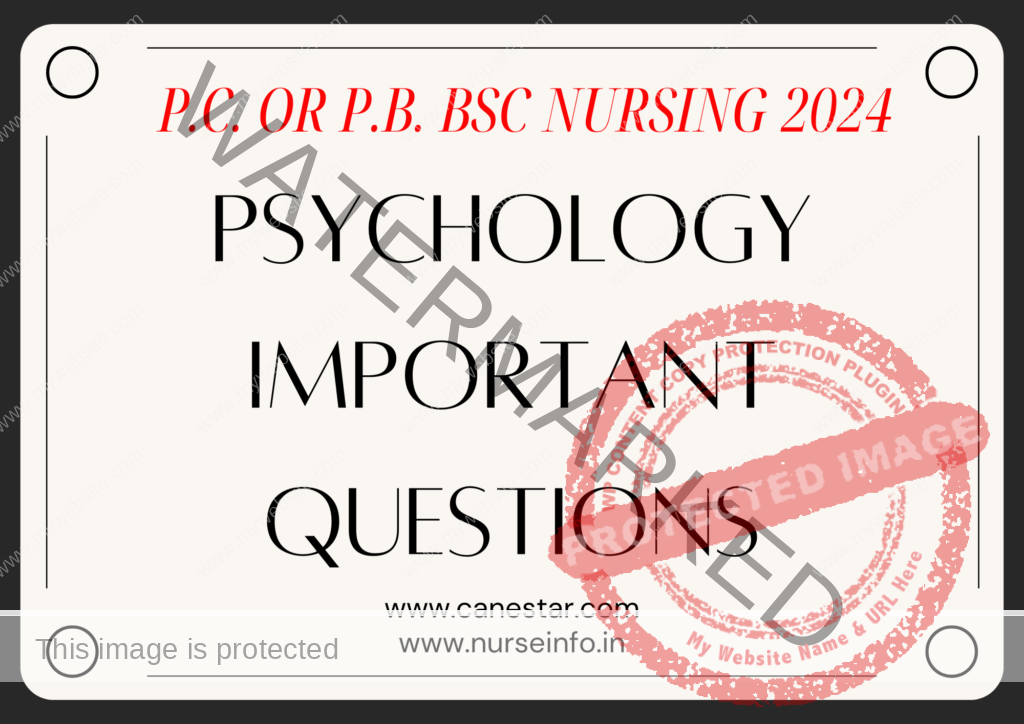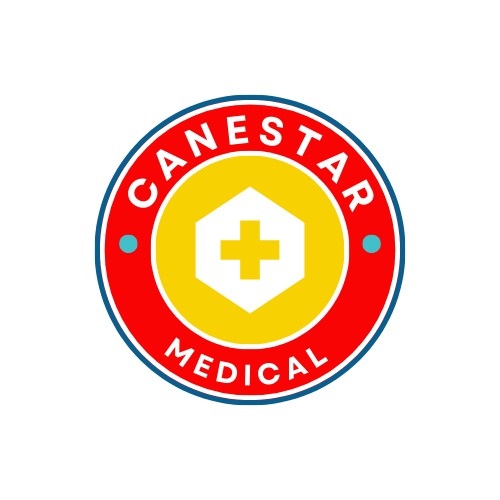PSYCHOLOGY
IMPORTANT QUESTIONS
FOR P.C. OR P.B. NURSING 2024
P.C.BSC NURSING FIRST YEAR PSYCHOLOGY IMPORTANT QUESTIONS – INC SYLLABUS 2024
LONG ESSAYS
- Define psychology. Explain the scope and methods of psychology
- What is a motive? Explain biological and social motives in detail
- Define learning? Explain theory of operant conditioning in detail
- Define learning. Discuss the theory of classical conditioning
- Define perception. Explain errors of perception in detail
- Define psychology. Discuss relevance of psychology in detail
- Define psychology. Explain the scope and methods of psychology
- Define emotions and explain the theories of emotions
- Define memory. Explain the types of memory with examples
- Define psychology and explain its nature and scope with special reference to nursing
- What is frustration? Distinguish between task-oriented and defense-oriented reactions
- Define personality. Discuss the various methods of assessing personality
- Define psychology? Explain its nature and scope with reference to nursing
- Discuss endocrine system and its influence on development of behavior
- Define memory. Explain the types of memory with examples
- Define psychology. Explain the various methods in psychology
- What is motivation? Explain the theories of motivation
- Explain the theories of intelligence is measured
- Define personality. Explain the theories of personality
- What is defense mechanism? Explain any five defense mechanism
- Discuss the role of heredity and environment in the development of human behavior
- Define psychology. Explain the scope of psychology in relation to nursing
- Discuss the behavioral changes and psychological needs of different age groups and chronically ill individuals
- How does frustration and conflict cause stress? briefly discuss the types of conflict
- Our behavior is controlled by our nervous system. Discuss
- Discuss the meaning of perception and explain prescribe perceptual organization
- What is intelligence? How it is measured? Name few tests of intelligence
- Explain the concept of mental health. discuss the characteristics of a mentally healthy person
- How frustration and conflict causes stress? briefly discuss the types of conflict and role of a nurse in stress management
- Define learning. Bring out the laws of learning. And their implication in nursing
- Define Psychology. How does psychology differ from sociology, biology and psychiatry?
- Explain the concept of intelligence quotient. How intelligence is measured?
- What are the nature and causes of Individual differences?
- Critically examine the definitions of psychology. Discuss the scope of psychology in relation to nursing
- Define emotion. Discuss the expression of emotion and the effect of emotion on the health of the individual
- Discuss the psychological needs of different age group and chronically ill individual
- What is ego defense mechanism? Illustrate any four with its purposes
- Define personality. Explain the nature and factors influencing the growth and development of personality of an individual
- Describe attention. Discuss the factors affect attention. What should be done to improve the accuracy of observation by a nurse?
- Explain the role of heredity and environment in causing individual differences
- What is forgetting? Explain forgetting during health and sickness
- Explain the characteristics of a mentally healthy person
SHORT ESSAYS
- Introspection method
- Factors influencing attention
- Conflicts
- Emotions in sickness
- Constituents of personality
- Psychological needs of aged people
- Significance of individual differences
- Measurement of intelligence
- Characteristics of perception
- Characteristics of mentally healthy person
- Explain the steps of problem solving
- Explain varieties of attention
- Discuss individual differences
- Laws of learning
- Explain methods of improving memory
- Explain the factors affecting mental health
- What are the types of thinking
- Types of intelligence tests
- Define personality. Discuss the personality development
- Distinguish sensation and perception
- Explain learning by conditioning
- Concept of mental hygiene
- Define attitudes? Discuss the characteristics of attitude
- Explain types of reasoning
- Discuss the principles of perception
- Explain factors influencing attention
- Discuss tools of evaluation
- Types of memory
- Heredity and environment
- Trial and error learning
- Types of intelligence tests
- Stages of development in thinking
- Modification of attitudes
- Physiological changes during emotions
- Laws of learning
- Discuss measurement of emotions
- Describe types of conflicts
- Write about tools of evaluations
- What is extra sensory perception
- Explain trial and error learning
- What is forgetting? Explain the organic causes of forgetting
- Discuss the steps of problem solving
- Deductive reasoning processes
- What are habits? How are they formed
- Discuss the theories of forgetting
- Projective techniques
- Factors influencing perception
- Conditioning learning
- Explain the factors affecting mental health
- Uses of psychology
- Principles of heredity
- Explain any two theories of emotion
- Discuss how thinking is developed
- Describe factors of perception
- Theories of intelligence
- Discuss the factors influencing creativity
- Scope of psychology
- Classify motives
- Measurement of attitudes
- Theories of emotions
- Define forgetting. Discuss biological causes of forgetting
- Define conflicts. Explain the types of conflicts
- Observation method
- Explain the physiological changes during emotions
- Concept of mental health
- Write a short note on ‘types of intelligence tests”
- Organization of perception
- Different ways to improve memory
- Briefly discuss various types of learning
- Heredity and environment
- Factors influencing attention and concentration
- Describe merits and demerits of experimental method
- Discuss twin and family studies in relation to development of behavior
- Enumerate theories of emotions
- Elaborate perceptual illusions
- What are the determinants of attention?
- Discuss Freud’s theory of psycho-sexual development
- Define creative thinking? Discuss stages of creative thinking
- Define attitudes? Name some characteristics of attitude
- What is problem solving? What role mental set plays in problem solving
- Experimental method
- Why psychology is regarded as sciences?
- What method would you use in studying the behavior of your patients.
- Distinguish between biological and social motives
- Analyse emotional experience and bring out its chief characteristics
- Write short notes of different types of intelligence tests
- Forgetting during sickness
- Errors in perception
- Social motives
- Self actualization
- Behavior
- Uses of personality assessment
- Hypersthesia
- Attitude in health and science
- Distribution of intelligence in the population
- Define memory
- Rationalization
- Hallucination
- Twins
- Discuss the causes of forgetting
- How attitudes are formed?
- Physiological drives that determine our daily behavior
- Methods of improving memory
- Nature of learning
- Principles of perception
- How does visual and auditory disorder effect learning?
- Explain the personality traits and nurse should develop
- Role of endocrine gland in determining behavior
- Factors influencing perception
- Describe abnormal sensations
- Uses of intelligence tests
- Forgetting during health and sickness
- Methods of assessing personality
- Discuss various conditions of learning
- Mention the types of learning. What should be done to improve the accuracy of observation?
- Discuss the principles of heredity
- Observations method
- How knowledge of psychology helps nurse to adjust in profession?
- Possible hazards to the mental health of a growing individual
- Discuss the role of environment in causing individual difference
- Internal and external changes during emotion
- Role of a nurse in change in attitude of her patients
- Effect of acute illness on personality
- Factors influencing memory
- Laws of learning
- Abnormalities in sensory perception
- Observational method
- Self actualization
- Factors influencing personality
- Behavior and sickness
- Types of memory
- Modification of attitudes
- Distribution of intelligence
- Laws of learning
SHORT ANSWERS
- Survey method
- Illusion
- Frustration
- Introvert
- Heredity
- Law of use and disuse
- Amnesia
- Attitude
- Mental hygiene
- Rationalization
- Aptitude test
- Introspection
- Conflict
- Rationalization
- Attitudes
- Define emotion
- Personality
- Transfer of learning
- Ivan Pavlov
- Social motives
- Principle of closure
- Errors in thinking
- Hallucination
- Motivation
- Self-actualization
- Id
- Reward and punishment
- Conflict
- Trail and error learning
- Intelligence
- Variables
- Psycho sexual stages of development
- Genius
- Uses of psychological tests
- Organization of perception
- Forgetting
- Hypothesis
- Chromosomes
- Aptitude tests
- Definition of motivation
- Survey method
- Emotions and health
- Span of attention
- Psychoanalysis
- Factors influencing perception
- Insightful learning
- Nature of attitude
- Levels of thinking
- Psychosocial development
- Types of conflict
- Introvert and extrovert
- Concept of I Q
- Attitude
- Super EGO
- Transfer of learning
- Sensation
- Steps of creativity
- Introspection
- Identical and Fraternal twins
- Projective Techniques
- Types of Intelligence
- Rating scales
- Frustration
- Attention
- Clinical Psychology
- Promotion of mental health
- Psychological needs of children
- Hypothesis
- Case-study method
- Extrovert
- Mental hygiene
- Id
- Reward and punishment
- Forgetting
- Rationalization
- Span of attention
- Sensory disorders
- Pure Psychology
- Naturalistic observation
- Emotional imbalance
- Principles of grouping
- Ponzo illusions
- Reinforcement
- Evaluation
- Types of reasoning
- Laws of learning
- Conflicts
- Verbal Test
- Define conflict
- What is sensory memory?
- Nature of attention
- Extra sensory perception
- Recitation method in memorizing
- Amnesia
- Significance of Individual differences
- Introspection method
- Abnormal psychology
- Division of attention
- Define conflict
- Personality
- Sensory disorders
- Drive reduction
- Individual difference in health and sickness
- Define the concept of mental health
- Define mechanisms
- Effective nursing
- Psychoneurosis
- Conflict in motives
- Mental retardation
- Neuro transmitters
- Trial and error method
- Adjustment mechanism
- Chromosomes
- List the branches of psychology
- Performance test
- Constituents of personality
- Sensation
- Para psychology
- Division of attention
- Needs
- Conflicts
- Emotions
- Genes
- Intelligence quotient
- Frustration
- Memory
- Mental health

